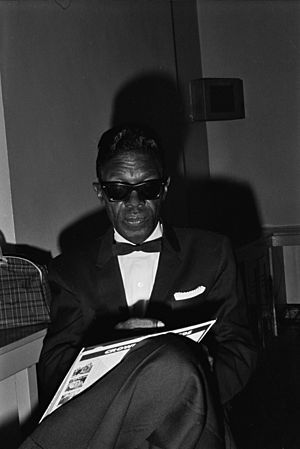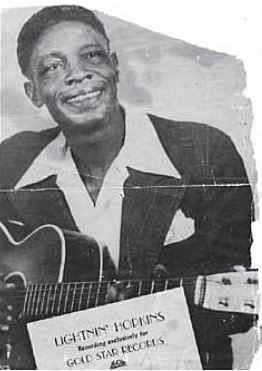Lightnin' Hopkins facts for kids
Quick facts for kids
Lightnin' Hopkins
|
|
|---|---|
 |
|
| Background information | |
| Birth name | Sam John Hopkins |
| Born | March 15, 1912 Centerville, Texas, U.S. |
| Died | January 30, 1982 (aged 69) Houston, Texas, U.S. |
| Genres | Electric blues, country blues, Texas blues |
| Occupation(s) | Guitarist, singer-songwriter |
| Instruments | Guitar, piano, organ, vocals |
| Years active | 1946–1982 |
| Labels | Aladdin, Modern, RPM, Gold Star, Sittin' in With/Jax, Mercury, Decca, Herald, Folkways, World Pacific, Vee-Jay, Arhoolie, Bluesville, Tradition, Fire, Candid, Imperial, Prestige, Verve, Jewel |
Samuel John "Lightnin" Hopkins (born March 15, 1912 – died January 30, 1982) was an American country blues singer, songwriter, and guitarist. He also sometimes played the piano. He was from Centerville, Texas.
In 2010, Rolling Stone magazine named him one of the top 100 greatest guitarists ever. He was ranked number 71. Many musicians were influenced by him. These include Townes Van Zandt, Hank Williams, Jr., and blues legends like Stevie Ray Vaughan. Stevie Ray Vaughan's song "Rude Mood" was inspired by Hopkins's song "Hopkins' Sky Hop."
Contents
The Life of Lightnin' Hopkins
Lightnin' Hopkins was born in Centerville, Texas. From a young age, he loved the sound of the blues. When he was only 8 years old, he met the famous blues musician Blind Lemon Jefferson. This happened at a church picnic in Buffalo, Texas.
Learning Music and Early Days
Hopkins learned a lot from his older cousin, Alger "Texas" Alexander, who was also a country blues singer. Another cousin, Frankie Lee Sims, was a Texas electric blues guitarist. Hopkins later recorded music with Sims. Hopkins often played guitar with Blind Lemon Jefferson at church gatherings. Jefferson rarely let anyone else play with him. This shows how talented Hopkins was even as a child.
In the late 1930s, Hopkins moved to Houston with his cousin Alexander. They hoped to become famous in the music scene there, but it did not work out. By the early 1940s, he was back in Centerville. He worked on a farm during this time.
Becoming "Lightnin'"
In 1946, Hopkins tried his luck in Houston again. He was singing on Dowling Street in Houston's Third Ward. This area later became his main home base. There, he was discovered by Lola Anne Cullum from Aladdin Records. This record company was based in Los Angeles.
Lola Cullum convinced Hopkins to travel to Los Angeles. There, he played with a pianist named Wilson Smith. They recorded twelve songs together in their first recording sessions in 1946. An executive at Aladdin Records thought their names needed more excitement. So, he called Hopkins "Lightnin'" and Wilson "Thunder."
Hopkins recorded more songs for Aladdin in 1947. After that, he went back to Houston. He started recording for Gold Star Records. In the late 1940s and 1950s, he mostly performed in Texas. He only sometimes traveled to the Midwest and East for recording and concerts. It is believed he recorded between 800 and 1,000 songs in his career. He often played at nightclubs in Houston, especially on Dowling Street. He recorded popular songs like "T-Model Blues" and "Tim Moore's Farm." By the mid-1950s, his many great recordings made him popular. He gained many fans among African American people and blues lovers.
Reaching a Wider Audience
In 1959, a blues researcher named Robert "Mack" McCormick found Hopkins. McCormick wanted to introduce Hopkins to more people. He first presented Hopkins to mixed audiences in Houston. Then, he took him to California. Hopkins played at Carnegie Hall in New York City on October 14, 1960. He performed with famous folk singers like Joan Baez and Pete Seeger. He sang the spiritual song "Mary Don't You Weep." In 1960, he signed with Tradition Records. One of his famous songs from this time was "Mojo Hand" in 1960.
In 1968, Hopkins recorded an album called Free Form Patterns. He was backed by the band 13th Floor Elevators. Throughout the 1960s and 1970s, he released one or two albums each year. He also toured a lot. He played at big folk music festivals, folk clubs, and colleges. He toured all over the U.S. and even went to Japan in 1978.
Hopkins was known as Houston's "poet-in-residence" for 35 years. He recorded more albums than any other blues musician. There is a statue of Hopkins in Crockett, Texas.
Lightnin' Hopkins passed away in Houston on January 30, 1982. He was 69 years old. His obituary in The New York Times said he was "one of the great country blues singers." It also called him "perhaps the greatest single influence on rock guitar players."
Hopkins's Instruments
His special Gibson J-160e "hollowbox" guitar is on display. You can see it at the Rock Hall of Fame in Cleveland. His Guild Starfire guitar is at the National Museum of African American History and Culture in Washington, DC. Both guitars are on loan from the Joe Kessler collection.
Lightnin' Hopkins's Musical Style
Hopkins's unique style came from playing alone for many hours. He often played without a band. His special fingerstyle technique allowed him to play many parts at once. He played the bass, rhythm, lead, and even percussion sounds all at the same time.
Guitar Techniques and Song Structure
He used both "alternating" and "monotonic" bass styles. He also added creative, often changing, musical phrases called turnarounds. He would tap or slap his guitar to add rhythmic sounds.
Most of Hopkins's music followed the standard 12-bar blues pattern. However, his singing and playing were very free and loose. Many of his songs were in the talking blues style. In this style, he would speak or talk parts of the lyrics. He was also a strong and confident singer.
Song Themes and Humor
His songs often talked about the difficulties of life in the segregated South. They also covered bad luck in love and other common blues topics. He sang about these subjects with humor and a good attitude. He often called himself "Poor Lightnin'" in his songs. This was when he talked about himself or was the main character in the song. One of his albums is even called Po' Lightnin'. Many of his songs had double entendres, which are words or phrases with two meanings. He was also known for his funny introductions to his songs.
Some of his songs gave warnings or made predictions. For example, in "Fast Life Woman," he sang:
You may see a fast life woman sittin' round a whiskey joint,
Yes, you know, she'll be sittin' there smilin',
'Cause she knows some man gonna buy her half a pint,
Take it easy, fast life woman, 'cause you ain't gon' live always...
Lightnin' Hopkins's Discography
This is a list of some of Lightnin' Hopkins's albums.
Early Collections
These albums collected songs he had recorded earlier:
- Early Recordings (Arhoolie, 1969) - songs from 1946-50
- Early Recordings Vol. 2 (Arhoolie, 1971) - more songs from 1946-50
- Lightnin' Hopkins Strums the Blues (Score, 1958) - songs from 1946-48
- Lightning Hopkins Sings the Blues (Crown, 1961) - songs from 1947-1951
- Last of the Great Blues Singers (Time, 1960) - songs from 1950-51
- Lightnin' and the Blues (Herald, 1960) - songs from 1954
- Blues Masters: The Very Best Of Lightnin' Hopkins (Rhino, 2000) - a more recent collection
Original Albums
These are some of his original albums:
- The Rooster Crowed in England (77, 1960)
- Lightnin' Hopkins (Folkways, 1959) - also called The Roots of Lightnin' Hopkins
- Country Blues (Tradition, 1959)
- Autobiography in Blues (Tradition, 1960)
- Down South Summit Meetin' (World Pacific, 1960) - with Brownie McGhee, Big Joe Williams, and Sonny Terry
- Last Night Blues (Bluesville, 1960) - with Sonny Terry
- Lightnin' (Bluesville, 1960)
- Lightnin' in New York (Candid, 1960)
- Mojo Hand (Fire, 1962)
- Blues in My Bottle (Bluesville, 1961)
- Blues Hoot (Horizon, 1963) - with Brownie McGhee and Sonny Terry
- On Stage (Imperial Records, 1962)
- Lightnin' Sam Hopkins (Arhoolie, 1962)
- Walkin' This Road by Myself (Bluesville, 1962)
- Lightnin' and Co. (Bluesville, 1962)
- Smokes Like Lightning (Bluesville, 1963)
- Lightnin' Strikes (Vee-Jay, 1962)
- Hootin' the Blues (Prestige Folklore, 1965)
- Goin' Away (Bluesville, 1963)
- The Swarthmore Concert (Prestige, 1993)
- Down Home Blues (Bluesville, 1964)
- Soul Blues (Prestige, 1965)
- Lightning Hopkins with His Brothers Joel and John Henry / with Barbara Dane (Arhoolie, 1966)
- My Life in the Blues (Prestige, 1965)
- Live at the Bird Lounge (Guest Star, 1964)
- The King of the Blues (Pickwick, 1965)
- Blue Lightnin' (Jewel, 1967)
- Live at Newport (Vanguard, 2002)
- Lightnin' Strikes (Verve Folkways, 1966)
- Something Blue (Verve Folkways, 1967)
- Thats My Story (Polydor, 1970)
- Blues Festival Song & Dance (Arhoolie, 1967) - with Mance Lipscomb and Clifton Chenier
- Texas Blues Man (Arhoolie, 1967)
- Free Form Patterns (International Artists, 1968)
- Talkin' Some Sense (Jewel, 1968)
- Lightnin' Hopkins Strikes Again (Home Cooking, 1975)
- The Great Electric Show and Dance (Jewel, 1969)
- California Mudslide (and Earthquake) (Vault Records, 1969)
- Lightnin'! (Poppy, 1969)
- In the Key of Lightnin' (Tomato, 2002)
- Lightning Hopkins in Berkeley (Arhoolie, 1970)
- Po' Lightnin' (Arhoolie, 1983)
- The Legacy of the Blues Vol. 12 (Sonet, 1977)
- New Orleans Jazz and Heritage Festival 1976 (Island, 1977) - with various artists
- The Rising Sun Collection Vol. 9 (Just a Memory, 1996)
- Mighty Crazy (Catfish, 2002) - with Big Mama Thornton
- The Rising Sun Collection (Just a Memory, 1996) - with Louisiana Red, Sonny Terry and Brownie McGhee
- Forever (Paris Album, 1983)
As a Guest Musician
Hopkins also played on albums by other artists:
- With Sonny Terry: Sonny Is King (Bluesville, 1963)
Films Featuring Lightnin' Hopkins
Lightnin' Hopkins appeared in or had his music featured in these films:
- The Blues Accordin' to Lightnin' Hopkins (1968), a film directed by Les Blank
- The Sun's Gonna Shine (1969), also directed by Les Blank
- Sounder (1972), a movie where Hopkins sings "Jesus Will You Come by Here" on the soundtrack
- His song "Once a Gambler" was used in the 2009 film Crazy Heart.
Books About Lightnin' Hopkins
Several books have been written about Lightnin' Hopkins and his music:
- Mojo Hand: An Orphic Tale, by J.J. Phillips
- Lightnin’ Hopkins: Blues Guitar Legend, by Dan Bowden
- Deep Down Hard Blues: Tribute to Lightnin', by Sarah Ann West
- Lightnin' Hopkins: His Life and Blues, by Alan Govenar
- Mojo Hand: The Life and Music of Lightnin' Hopkins, by Timothy J. O'Brien and David Ensminger
See also
 In Spanish: Lightnin' Hopkins para niños
In Spanish: Lightnin' Hopkins para niños
- List of blues musicians
- Texas blues
- Six Strings Down
Images for kids
 | Audre Lorde |
 | John Berry Meachum |
 | Ferdinand Lee Barnett |



